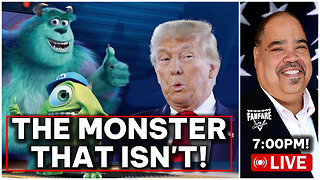Premium Only Content

Episode 2379: The Crisis of Faith: How Lack of Catholic Education and Vatican II led to Decline
The Crisis of Faith: How Lack of Catholic Education and Vatican II led to Decline
In today’s episode, we will delve into the profound crisis of faith many Catholics face today, examining how a lack of education beyond the age of 14 in the teachings of the Magisterium, doctrines, dogmas, and catechism has contributed to this decline. We will also explore the impact of the Second Vatican Council and the significant loss of religious vocations on the weakening of faith within the Catholic community. Additionally, we will discuss specific issues arising from the post-Vatican II era and the pontificate of Pope Francis, examining how certain teachings and practices may have contributed to the current crisis. Finally, we will explore why the lack of sacramental confession prior to receiving the Eucharist, the diminished belief in transubstantiation, the erosion of reverence and decorum at Mass, and the Church’s embrace of the modern world have led to indifferencism, relativism, and humanism, further contributing to the Church’s decline and destruction.
In recent decades, the Catholic Church has witnessed a disturbing trend: a significant number of young Catholics drifting away from the faith. One critical factor in this phenomenon is the cessation of religious education around the age of 14. At this age, many young Catholics are confirmed, but often, this marks the end of their formal religious education. Without continued learning, their understanding of the faith remains rudimentary, leaving them ill-equipped to navigate the complexities of modern life while upholding Catholic values.
The teachings of the Magisterium, the doctrines and dogmas of the Church, and the catechism form the bedrock of Catholic belief. When these elements are not thoroughly understood or internalized, the faith can appear superficial and irrelevant. A strong foundation in these teachings is essential for developing a mature, resilient faith capable of withstanding the challenges and temptations of contemporary society.
Adding to this issue is the fallout from the Second Vatican Council (Vatican II). While the Council aimed to modernize the Church and make it more accessible, some argue that it led to a departure from traditional practices and teachings. The post-Vatican II era saw a decline in the number of religious vocations, which further weakened the Church’s ability to educate and guide the faithful. The loss of nuns, priests, and brothers meant fewer role models and mentors to nurture the faith of younger generations.
Post-Vatican II, several changes were implemented that some traditional Catholics view as problematic. For instance, the shift from the Latin Mass to the vernacular was intended to make the liturgy more accessible but led to a loss of the sacred and mysterious elements that many found spiritually enriching. The relaxed disciplines regarding fasting and other penitential practices have also been seen as contributing to a general weakening of Catholic identity.
Moreover, during the pontificate of Pope Francis, certain teachings and practices have sparked controversy and concern among traditionalists. His emphasis on pastoral care over strict adherence to doctrine has been praised for its inclusivity but criticized for potentially undermining the Church’s moral teachings. Documents like Amoris Laetitia, which discusses the pastoral approach to issues such as divorce and remarriage, have been seen by some as contradictory to established Church doctrine.
Pope Francis’s focus on social issues, while important, sometimes appears to overshadow the doctrinal clarity that traditionalists feel is essential. His approach to interfaith dialogue and statements perceived as ambiguous about the uniqueness of Christ as the sole means of salvation have raised questions about the direction in which he is leading the Church. These perceived ambiguities and the shift towards a more progressive interpretation of Church teachings are seen by some as contributing factors to the crisis of faith.
Another significant issue is the decline in the practice of sacramental confession prior to receiving the Eucharist. Traditional Catholic teaching emphasizes the importance of being in a state of grace when receiving Holy Communion, which is achieved through the sacrament of confession. However, with the post-Vatican II emphasis on ecumenism and a more lenient pastoral approach, the necessity of confession has been de-emphasized. This shift has led to many Catholics receiving the Eucharist without first seeking reconciliation, diminishing the sacredness and spiritual preparation required for this sacrament.
Coupled with this is a loss of belief in the doctrine of transubstantiation—the teaching that during the consecration at Mass, the bread and wine truly become the Body and Blood of Christ. This core belief has weakened as catechetical instruction has declined and traditional practices have been sidelined. Efforts to make the liturgy more palatable to Protestant sensibilities, in an attempt to achieve ecumenical harmony, have sometimes led to a downplaying of this doctrine, causing confusion and a loss of reverence among the faithful.
This ecumenical approach, aimed at fostering unity with other Christian denominations, often involved minimizing differences in beliefs and practices. While the intention was to create a more inclusive and harmonious Christian community, it inadvertently led to a dilution of distinctly Catholic teachings. As a result, essential doctrines like transubstantiation and the necessity of sacramental confession were downplayed or misunderstood, contributing to a weakened faith and a diminished sense of the sacred.
These changes have also led to a noticeable decline in the reverence and decorum observed at Mass. The faithful no longer dress appropriately for the Holy Sacrifice of the Mass, treating it as a casual gathering rather than a solemn and sacred event. This shift in attitude can be traced back to a broader cultural change within the Church post-Vatican II, where the emphasis on accessibility and inclusivity overshadowed the need for maintaining the sacredness and dignity of the liturgy.
Additionally, the loss of reverence extends to behavior within the church itself. Many no longer remain quiet while in the presence of the Holy Tabernacle, forgetting the profound significance of Christ’s real presence. The atmosphere of prayerful silence that once characterized Catholic churches has given way to casual chatter, further eroding the sense of sacredness.
Even the clergy have not been immune to these changes. Many priests no longer dress in clerical cassocks while among the faithful, opting for more casual attire that diminishes their distinct role and the visible witness of their vocation. Furthermore, the manner in which priests approach the altar has changed. The once solemn and penitential processions have become more relaxed and informal, reflecting a shift in focus from the Holy Sacrifice of the Mass as the re-presentation of Christ’s sacrifice on Calvary to a communal gathering of the people.
Moreover, the Church’s embrace of the modern world has caused indifferencism, relativism, and humanism to infect its teachings and practices. Indifferencism—the belief that one religion is as good as another has flourished in an environment where ecumenical efforts often downplay the unique truths of the Catholic faith. This has led to a widespread attitude of religious indifference among the faithful, undermining the urgency and commitment to live out and evangelize the Catholic faith.
Relativism—the idea that truth is subjective and varies from person to person has also taken root. When the Church softens its stance on absolute truths to accommodate modern sensibilities, it creates confusion and diminishes the authority of Church teachings. This erosion of doctrinal clarity has left many Catholics uncertain about the core tenets of their faith, leading to a weakened commitment and an increased vulnerability to secular ideologies.
Humanism, with its focus on human values and concerns often to the exclusion of the divine, has further infiltrated the Church. By prioritizing social issues and human welfare over spiritual and doctrinal integrity, the Church risks becoming more of a social service organization than a beacon of divine truth. This shift diverts attention from the ultimate goal of salvation and the worship of God, leading to a faith experience that is more about communal interaction than a transcendent encounter with the divine.
These philosophical shifts have further contributed to the erosion of traditional practices and reverence. Indifferencism has made it seem acceptable for the faithful to treat the Mass and sacred spaces with casualness, relativism has led to subjective interpretations of reverence and decorum, and humanism has shifted the focus from divine worship to human-centered community gatherings. These shifts have had a profound impact on the faith and behavior of Catholics, leading to a decline in the sacredness of the liturgy and the reverence due to the sacraments and sacred spaces
Conclusion
As we reflect on the current state of the Catholic faith, it becomes evident that restoring a strong, educated, and vibrant community is crucial. Reinvigorating religious education beyond confirmation, emphasizing the timeless teachings of the Magisterium, and revisiting the traditional practices that sustained the Church for centuries could help reverse the trend of declining faith. Moreover, addressing the influences of indifferencism, relativism, and humanism is essential to reclaiming the integrity and distinctiveness of the Catholic faith.
The challenge before us is great, but with a renewed commitment to education and tradition, we can rebuild a Church that not only survives but thrives in the modern world. Central to this revival will be Marian and Christ-centered devotional practices, recognizing that without Jesus’ grace and Mary’s intercession, nothing is possible.
Here are some tangible spiritual changes to help save the Church:
1. Revitalize Religious Education: Extend catechetical instruction beyond the age of 14, ensuring that Catholics receive ongoing education in the faith throughout their lives. Adult education programs, retreats, and study groups focused on the Magisterium, doctrines, dogmas, and catechism can deepen understanding and commitment.
2 Restore Traditional Liturgy: Reintroduce elements of the traditional Latin Mass and other reverent practices to highlight the sacredness and mystery of the liturgy. This can include the use of Latin, Gregorian chant, and traditional vestments, which can help foster a sense of the sacred.
3. Emphasize Confession: Reinforce the importance of sacramental confession as a prerequisite for receiving Holy Communion. Regular confession not only prepares the soul to receive the Eucharist worthily but also deepens the awareness of personal sin and the need for God’s mercy.
4. Strengthen Marian Devotions: Marian devotions, such as the Rosary, the Angelus, and the consecration to the Immaculate Heart of Mary, should be encouraged and practiced regularly. Mary’s intercession is a powerful aid in drawing closer to Christ and growing in holiness. Promote Marian feast days and pilgrimages to Marian shrines to deepen the connection with the Mother of God.
5. Deepen Christ-Centered Devotions: Encourage devotions centered on Jesus, such as the Sacred Heart of Jesus, Eucharistic Adoration, and the Stations of the Cross. These practices help the faithful to focus on the love and sacrifice of Christ, fostering a deeper relationship with Him and a greater appreciation for His presence in the Eucharist.
6. Reinforce Belief in Transubstantiation: Catechesis should emphasize the real presence of Christ in the Eucharist, ensuring that the doctrine of transubstantiation is clearly taught and understood. This can be supported by practices that highlight the sacredness of the Eucharist, such as Eucharistic processions, Adoration, and Benediction.
7. Cultivate Reverence at Mass: Encourage a culture of reverence at Mass, including appropriate dress, silence in the presence of the Tabernacle, and respectful participation in the liturgy. This fosters an environment where the sacredness of the Mass is evident and respected by all.
8. Promote Clerical Identity and Reverence: Encourage priests to wear their clerical attire as a visible sign of their vocation and to maintain the dignity and reverence due to their office. Encourage a return to solemn and reverent liturgical practices, emphasizing the Holy Sacrifice of the Mass as the re-presentation of Christ’s sacrifice on Calvary.
By embracing these practices, the faithful can cultivate a deeper connection with Jesus and Mary, drawing on their grace and intercession to strengthen and revitalize the Church. The path to spiritual revival lies in returning to the roots of our faith, fostering a deep, personal relationship with Christ, and seeking the intercession of the Blessed Virgin Mary. With these foundations, the Church can emerge renewed and strengthened, ready to face the challenges of the modern world while remaining firmly rooted in its timeless traditions.
-
 2:35:23
2:35:23
FreshandFit
4 hours agoWhy Black Men Don't Date Black Women Debate
17.4K10 -
 2:03:42
2:03:42
Inverted World Live
8 hours agoBigfoot Corpse Coming to the NY State Fair | Ep. 94
88K17 -
 6:16:23
6:16:23
SpartakusLIVE
8 hours ago$1,000 Pistol Challenge || #1 ENTERTAINER of The EONS Eradicates BOREDOM
66.4K2 -
 2:33:37
2:33:37
TimcastIRL
6 hours agoTrump Orders Review of Smithsonian For Being Woke & Out of Control | Timcast IRL
161K51 -
 3:09:10
3:09:10
Barry Cunningham
9 hours agoPRESIDENT TRUMP HAS TAKEN THE MONSTER AWAY FROM THE LEFT! HORROR STORIES WON'T WORK ANYMORE!
69.6K73 -
 1:29:55
1:29:55
WickedVirtue
3 hours agoLate Night Fortnite w/ Friends
35.5K -
 3:34:06
3:34:06
This is the Ray Gaming
4 hours ago $0.29 earnedCould you be? Would you be? Won't you be my RAYBOR? | Rumble Premium Creator
20.8K -
 1:46:52
1:46:52
JahBlessGames
5 hours ago🎉Come een' and come tru' - VIBES | MUSIC | GAMES
39.5K -
 38:47
38:47
MattMorseTV
7 hours ago $12.09 earned🔴Tulsi just CLEANED HOUSE.🔴
59.2K99 -
 6:24:06
6:24:06
Reolock
8 hours agoWoW Classic Hardcore | WE'RE BACK!!
25.1K1